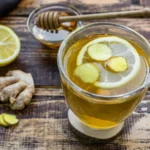
Ginger has been cherished for its numerous health benefits for centuries, often hailed as a natural remedy for a variety of ailments. One of its most prominent uses is in alleviating nausea, which has led to the popularity of ginger-based products like Gin Gins. But are these ginger products truly effective for nausea? The world of ginger supplements is vast, ranging from ginger candies like Gin Gins to Gravol ginger tablets and even more unconventional forms like ginger in tea, raw ginger, or powdered forms such as haldi powder. As many people turn to natural solutions for nausea, it is important to understand whether these ginger products can live up to the expectations.
In this article, we will explore the potential of Gin Gins and other ginger-based products in combating nausea, supported by scientific research, expert opinions, and practical knowledge. We will examine the various forms of ginger available in the market, such as ginger root, ginger spice, gingerol (the active compound), and even more niche products like ginger and lemongrass blends. Furthermore, we will delve into the effectiveness of ginger for specific groups, including pregnant women, and its synergy with other natural remedies like turmeric and honey crystals. Whether you’re considering ginger for morning sickness during pregnancy or looking for a natural remedy to calm digestive discomfort, this article will give you a thorough overview of ginger’s role in alleviating nausea.
Understanding Ginger: Its Properties and Uses for Health
Before diving into the effectiveness of ginger-based products, it’s important to understand the plant itself. Ginger, scientifically known as Zingiber officinale, is a flowering plant with a long history of use in medicine. The ginger root (adrak in English) is the part of the plant that is most commonly used for its health benefits, thanks to its rich chemical composition. The active compounds in ginger, primarily gingerol, are responsible for its anti-inflammatory, antioxidant, and digestive benefits, making it an excellent remedy for nausea and vomiting.
In traditional medicine, ginger has been used to treat a wide range of ailments, from digestive issues and motion sickness to headaches and pain relief. Over time, ginger’s therapeutic potential has been supported by scientific studies, validating its role in managing nausea, especially during pregnancy or chemotherapy. This has led to the rise in popularity of various ginger products, including Gin Gins, which are designed specifically for those seeking a quick, convenient solution to nausea.
The Rise of Ginger Products: Gin Gins, Gravol Ginger, and Other Remedies

In recent years, ginger-based products like Gin Gins, a ginger candy made by The Ginger People, have gained immense popularity as a natural solution for nausea. These candies combine the health benefits of ginger with the convenience of a portable, easy-to-consume form. But, are they truly effective?
Gin Gins contain real ginger extract and are formulated to provide a quick and pleasant way to relieve nausea. For many individuals, the taste and soothing qualities of these ginger candies offer immediate relief from mild nausea, making them a popular choice. However, it is important to note that the effectiveness of these products can vary from person to person, depending on the severity of the nausea and the specific cause of it.
Another popular ginger-based product is Gravol Ginger, a medication that combines ginger with other ingredients to relieve nausea, especially for those suffering from motion sickness or upset stomachs. Gravol Ginger offers a more concentrated dose of ginger, making it an option for more severe cases of nausea, especially when the nausea is related to travel or digestion. For those seeking a gentler remedy, other forms like ginger tea, ginger powder (haldi powder in English), or fresh ginger root may offer a milder approach.
Does Ginger Work for Nausea? What the Research Says
Numerous studies have explored the effectiveness of ginger in relieving nausea. One of the most well-documented areas where ginger has proven beneficial is in treating morning sickness during pregnancy. Research suggests that ginger can significantly reduce the frequency and intensity of nausea and vomiting in pregnant women, making it a natural alternative to pharmaceutical treatments. However, it is always advisable to consult a healthcare provider before using ginger during pregnancy, especially in high doses.
In addition to pregnancy-related nausea, ginger has shown promise in managing nausea caused by chemotherapy treatments. A 2011 study published in the Journal of Clinical Oncology found that ginger supplementation was effective in reducing chemotherapy-induced nausea and vomiting. This is likely due to ginger’s ability to reduce inflammation and irritation in the gastrointestinal system, helping to calm nausea symptoms.
While studies support the efficacy of ginger for nausea, the exact amount needed to be effective can vary. Some studies suggest that doses of 1 to 2 grams of ginger per day can help alleviate nausea, but it is important to consider the form in which it is consumed. For instance, Gin Gins and other ginger candies contain much lower doses of ginger, so they may not provide the same results for more severe cases of nausea.
Forms of Ginger: Which One Works Best for Nausea?
When considering ginger for nausea, there are many different forms available, each offering its own advantages and disadvantages. Below are some common forms of ginger used for nausea relief:
1. Fresh Ginger (Adrake)
Fresh ginger root is perhaps the most effective form for alleviating nausea. Its high gingerol content makes it a potent anti-nausea remedy. You can chew on a small piece of fresh ginger or brew it into a tea to relieve nausea. This form of ginger can be especially effective for morning sickness or digestive upset.
2. Ginger Candies (Gin Gins)
Gin Gins are a convenient and tasty option for those who need a quick and portable solution to nausea. These candies contain ginger extract and are easy to carry in a bag or pocket, making them ideal for those who experience nausea while on the go. While they may not provide as much ginger as fresh ginger, they still offer effective relief for mild nausea.
3. Ginger Tea
Ginger tea is a popular remedy for nausea. It is gentle on the stomach and can be enjoyed hot or cold. Ginger tea also allows you to combine ginger with other soothing herbs like lemongrass, which can enhance its calming properties. This tea is especially useful for long-lasting nausea relief, as it provides hydration and a gradual, consistent dose of ginger.
4. Ginger Powder (Haldi Powder in English)
Ginger powder, like haldi powder, is an easy-to-use option that can be added to smoothies, teas, or even food. It can be an effective remedy for digestive upset and nausea. The powdered form may not be as potent as fresh ginger but still provides many of the same benefits in a more concentrated form.
5. Ginger Supplements (Gravol Ginger)
For those dealing with more severe nausea, ginger supplements like Gravol Ginger offer a more potent dose of ginger in a controlled, consistent manner. These supplements are ideal for individuals suffering from motion sickness, chemotherapy-induced nausea, or more chronic nausea conditions. However, supplements should always be taken with caution and under the guidance of a healthcare provider.
Ginger in Pregnancy: A Natural Solution for Morning Sickness
One of the most common uses of ginger is for alleviating nausea during pregnancy. Morning sickness, a condition characterized by nausea and vomiting during the first trimester, affects a significant number of pregnant women. Ginger has been shown to reduce the severity of morning sickness symptoms, offering a natural alternative to pharmaceutical drugs.
Studies have indicated that ginger can help pregnant women reduce nausea without the risks associated with some medications. Pregnant women can benefit from ginger tea, ginger candies, or even ginger supplements. However, it is essential to note that high doses of ginger during pregnancy may pose risks, such as an increased chance of bleeding. Therefore, it is always recommended to consult a healthcare provider before using ginger for pregnancy-related nausea.
Other Complementary Natural Remedies for Nausea
Ginger is often combined with other natural remedies to enhance its effectiveness in treating nausea. For example, ginger and lemongrass are sometimes used together in teas, as both have soothing properties that complement each other. Lemongrass has mild anti-inflammatory effects that can help reduce nausea and digestive discomfort when combined with ginger.
Additionally, turmeric, often referred to as “haldi” in English, is another herb that has been used for centuries to treat digestive issues and inflammation. Turmeric has anti-inflammatory properties that may complement ginger’s ability to reduce nausea, making the combination of ginger and turmeric a potent remedy for various forms of nausea.
Conclusion: The Power of Ginger in Managing Nausea
In conclusion, ginger is undoubtedly a powerful natural remedy for nausea, with a long history of use in traditional medicine and increasing scientific backing. Whether in the form of Gin Gins, fresh ginger root, or Gravol ginger tablets, ginger offers a wide range of options for those looking to alleviate nausea. The gingerol compound found in ginger is particularly effective at calming nausea and reducing inflammation, making it a suitable solution for a variety of conditions, from pregnancy-related morning sickness to nausea caused by chemotherapy.
However, as with any remedy, it is essential to consider the individual’s specific needs and the severity of their nausea. For mild cases, ginger candies like Gin Gins or ginger tea may offer sufficient relief, while more severe nausea may require ginger supplements or even a combination of ginger and other natural remedies like turmeric. Pregnant women should always consult their healthcare provider before using ginger for nausea relief, and individuals with chronic nausea should consider a personalized approach with professional guidance.
Overall, ginger continues to prove its worth as a natural remedy for nausea, and its versatility in various forms makes it an accessible and effective solution for many individuals.











